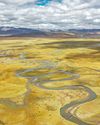
With 222 species of mammals, 420 bird species and 15,000 types of plants, the forest of Borneo is almost twice as old as the Amazon Rainforest and has hosted an almost incomprehensible number of animal species for more than 130 million years. For the vast majority of that time, human presence has been minimal, with only small indigenous tribes that coexisted with the native animals and paid their respects to the forest.
However, with the onset of industrialisation and modernisation, the geographical landscape of Borneo has been irreversibly changed. Just over the last five decades, Borneo's human population has doubled to around 19 million people and the island has seen rapid development in the form of high-rise apartments, five-star hotels and shopping malls shaping its largest cities. As time goes on, urban areas are only growing, and even in rural areas, populations are swelling.
Inevitably, something must give to make room for this growing human presence. As the population balloons, man-made structures are steadily eating away at Borneo's forests. In the 1930s, roughly three-quarters of the island was forested. Today, that figure has been reduced to half, a loss of some 187,000 square kilometres of forest.
This level of rainforest reduction spells disaster for Borneo's biodiversity, with the threat of extinction looming large. There are a number of reasons why Borneo's rainforests have been suffering in recent decades, and they all stem from the activities and population growth of humans.
Logging
Esta historia es de la edición AG 06/2021 - 151 de ASIAN Geographic.
Comience su prueba gratuita de Magzter GOLD de 7 días para acceder a miles de historias premium seleccionadas y a más de 9,000 revistas y periódicos.
Ya eres suscriptor ? Conectar
Esta historia es de la edición AG 06/2021 - 151 de ASIAN Geographic.
Comience su prueba gratuita de Magzter GOLD de 7 días para acceder a miles de historias premium seleccionadas y a más de 9,000 revistas y periódicos.
Ya eres suscriptor? Conectar

A Spectrum Of Scarlet: The Symbolic Red Of Asian Flags
A common thread that unites many Asian flags is the prominent use of red, a colour rich with symbolism

Curry: A World of Flavour, Tradition, and Culture
From its humble beginnings in India, the concept of "curry" has evolved into a culinary language understood around the world

The Power Of Asian Red Fruits - Discover 10 Nutrient-Rich Gems Of The East
In the vast tapestry of Nature, Asia has gifted the world an array of unique and vibrant fruits, particularly those in shades of red. These scarlet-hued gems, packed with flavour and nutrients, not only add a burst of colour to your plate but also carry valuable health benefits. From antioxidant-rich goji berries to the exotic dragon fruit, let's explore some of the most popular red fruits from Asia and discover why they should be part of your diet.

Bhutan: A World Of Its Own
With its majestic monasteries, red-robed monks, charming rural villages, and vibrant festivals, the Kingdom of Bhutan is a Himalayan paradise that promises an enriching travel experience like no other

Take The Red Pill
From the vermilion torii gates of Japan to the famed rust-hued walls of India's Agra Fort, the burgundy robes of Burmese monks to scarlet chillies drying in the Bangladeshi sun, red is the quintessential colour of Asia.

70 Days for Our Land Animals
Raising awareness about conservation, the environment, and the land-dwelling species of the world

The Red Panda
Meet the elusive guardian of the Eastern Himalayas

Revealed Doctor Yellow
Japan Railways' special lemony Shinkansen is a rare sight to behold

The Mighty Yellow
Over 5,000 kilometres long and flowing through nine provinces and autonomous regions, the Yellow River is China's second largest, after the Yangtze, while its basin is deemed the cradle of Chinese civilisation

Wildlife Big Yellow Beauty
The popular "amelanistic" form of the Burmese python is considered among the most beautiful snakes - if that's your sort of thing